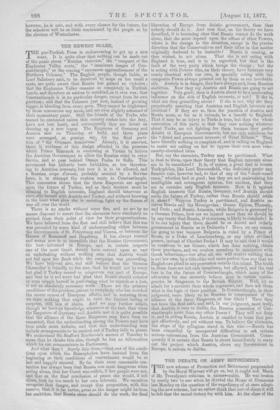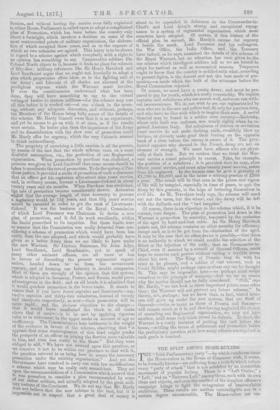THE DEBATE ON ARMY RETU1EMENT.
THE new scheme of Promotion and Retirement propounded by the Royal Warrant will go on, but it ought not. Much of Mr. Trevelyan's criticism is unanswerable. He was beaten by nearly two to one when he divided the House of Commons last Monday on the question of the expediency of at once adopt- ing the new scheme, but we rather think that out-of-doors it will be felt that the moral victory lay with him. At the close of the
Session, and without having the matter even fully explained in either House,Parliament is called upon to adopt a complicated plan of Promotion, which has been before the country only about a fortnight, which involves a decision on some of the most controverted points of military organisation, the elabora- tion of which occupied three years, and as to the expense of which no two actuaries are agreed. This hurry is to be shown in regard to a scheme against which everybody with a right to an opinion has something to say. Conservative soldiers like Colonel North object to it, because it finds no place for colonels of fifty-five ; military reformers like Sir Henry Havelock and Lord Sandhurst argue that we ought not hurriedly to adopt a plan which perpetuates effete ideas as to the fighting unit of our Army ; and Liberals of all shades are alarmed at the prodigious expense which the Warrant must involve. If ever the constituencies understand what has been done, they will have something to say to the virtual voting, of twelve to sixteen millions—for the scheme may cost all this before it is worked out—at one o'clock in the morn- ing, without any adequate discussion, and without, perhaps, ten Members of the House being fully aware of the details of the scheme. Mr. Hardy himself owns that it is an experiment, and yet he means to go on with it at once, as if the results were certain. No better plea than the impatience of the Army and its dissatisfaction with the slow rate of promotion could Mr. Hardy offer for urgency, which the very Colonels seemed to think extraordinary. The propriety of exercising a little caution is all the greater, by reason of the fact that the whole scheme rests on a most doubtful assumption, viz., the perfection of our Regimental organisation, When promotion by purchase was abolished, a promise was given by Lord Cardwell that some means should be taken to accelerate the rate of promotion. To do the system of Pur- chase justice, it provided a mode of promotion of such a character that an officer got his captaincy after about nine years' service, and, in ordinary course, became a Lieutenant-Colonel in about twenty years and six months. When Purchase was abolished, the rate of promotion became considerably slower. Actuaries ratfed that the average length of time necessary to procure a ,captaincy would be lat years, and that 33i years' service would be essential in order to get the rank of Lieutenant- Colonel, It was the business of the Royal Commission of which Lord Penzance was Chairman to devise a new plan of promotion, and it did its work excellently, within the limits prescribed to its inquiries. But these limits were so narrow that the Commission was really debarred from con- sidering a scheme of promotion which would have been less costly than the one adopted, and which would probably have given us a better Army than we are likely to have under the new Warrant. Sir Lintorn Simmons, Sir John Adye, Lord Sandhurst, Lord Strathnairn, not to speak of many other eminent officers, are all more or less in favour of discarding the present regimental organi- sation, handed down to us from the seventeenth century, and of forming our Infantry in double companies. Most of them are strongly of the opinion that this system, which is adopted in Germany, France, and Russia, would prove advantageous in the field ; and on all hands it is admitted that it would quicken promotion in the lower ranks. It stands to reason that if you have fewer captains and lieutenants—say, twelve captains and thirty-two subalterns, instead of twenty and thirty-six respectively, as now—their promotion will be more rapid ; and the obvious objection to the change— that it would leave unaffected the block in all ranks above that of major--is to be met by applying rigorous rules as to retirement in the upper ranks on account of age or inefficiency. The Commissionera bore testimony to the weight of the evidence in favour of the scheme, observing that "it appears that some rearrangement of this kind might render the prospects of an officer on joining the Service more valuable to him, and even less costly to the State." But they were obliged to add, "We have not entered upon this question, as we conceive it not to be within our province to deal with it, the question referred to us being how to create the necessary Promotion under the existing organisation." And yet the Government have resolved to carry out with few modifications a scheme which may be really only second-best. They act Upon the reoonamendations of a Commission which avowed that it was powerless to consider a plan recommended by some of our ablest soldiers, and actually adopted by the great mili- tary nations of the Continent. We do not say that Mr. Hardy does . y not believe that the new scheme is the best, but it is impossible not to suspect that a great deal of money is about to be expended in deference to the Commander-in- Chief's and Lord Airey's strong and exceptional repug- nance to a system of regimental organisation which most countries have adopted. Of course, if this history of the official plan be correct, Mr. Hardy's excuse for urgency is beside the mark. Lord Penzance and his colleagues, the War Office, the India Office, and the Treasury have indeed, as he says, examined the details of the scheme of the Royal Warrant, but no attention has been given to the one scheme which intelligent soldiers tell us we are bound to adopt for tactical as well as economical reasons. Taxpayers ought to know that the aountry is saddled with what, according to present lights, is the dearest and not the best mode of pro- motion,—a mode which the bulk of the witnesses before the Royal Commission rejected.
Of course, we must have a young Army, and must be pre- pared to pay for youth, which is a costly commodity. We require captains and subalterns who can march well, and even run with- out inconvenience. We do not wish to see our regiments led by men who are in the sere and yellow leaf, fit only for garrison duty, and who have no t'lan, with which to inspire their men. A useful General may be found in a soldier over seventy—Radeteky, whose only fault was rashness, was nearly eighty when he re- gained Austrian Italy. But subalterns of sixteen or seventeen years' service do not make dashing raids, stealthily blow up bridges, or cleverly make good their footing on the opposite bank of a river before the enemy is aware of it. The grey- haired captains who abound in the French Army are not an element of strength. We must have officers who are physi- cally at their best. But we confess that we think the War- rant carries a sound principle to excess. Take, for example, the position of a subaltern ; it is provided. that he may, after fifteen years' service, and must after twenty years' service, retire from his regiment. In the former ease he gets a gratuity of £1,700 to £2,000, and in the latter a retiring pension of £200 a year. ,The result will be that men in the prime and vigour of life will be tempted, especially in time of peace, to quit the Army by this gratuity, in the hope of bettering themselves in civil life. As Mr. Trevelyan truly says, the scheme will weed out not the tares, but the wheat, and the Army will be left with the dullards and the "bad bargains,"
Of course, there is an objection to the scheme which, if it be correct, cuts deeper. The plan of promotion laid down in the Warrant is promotion by seniority, tempered by the exclusion of the aged by hard-and-fast rules. As Sir Henry Havelock points out, the scheme contains no other security for efficiency except such as is to be got from the elimination of the aged. It may be the case that no other device is possible,—that there is no authority to which we could confide the selection of the fittest or the rejection of the unfit ; that no Commander-in- Chief, even if assisted by a council of General Officers, could hope to exercise such powers without raising a terrible storm about his ears. The King of Prussia may do with his army as he pleases, and a soldier of vast renown, such as Count Moltke, might perhaps raise or abase any one he thought fit. This may be impossible here—we perhaps must resign ourselves to the principle of seniority—but we see no reason why the matter should not be fully considered. "Still," says Mr. 1-lardy." we can look to these important points seine other time ; the Warrant will not prevent any future reforms," In theory, not, perhaps ; but we know that, in fact, vested inter- ests will grow up under the new system, that our Staff of Generals—twice as many as those of Prussia and Saxony— will remain much as it is, and that having neglected the chance of amending our Regimental organisation, we may not have another, until some rude trials reveal its defects, In short, the Warrant is a costly instance of putting the cart before the horse,—settling the terms of retirement and promotion before the preliminary question as to how many officers are required in each grade is touched.































 Previous page
Previous page